MercoPress. South Atlantic News Agency
Tag: argentina elections
-
Monday, September 13th 2021 - 09:46 UTC
Macrists win most districts in Argentina's primary elections

Argentina's ruling Frente de Todos (FdT) coalition Sunday took a heavy blow by losing the Open, Simultaneous and Mandatory Primary (PASO) elections to the opposition Juntos por el Cambio (JxC) alliance of former President Mauricio Macri in most districts nationwide.
-
Friday, September 10th 2021 - 09:30 UTC
Argentine President Fernández underscores differences between him and Macri ahead of primary elections
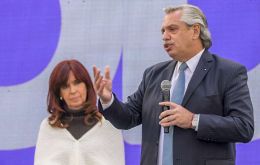
Argentine President Alberto Fernández and Vice President Cristina Fernández de Kirchner took centre stage Thursday as the ruling Frente de Todos party rounded up its political campaign aimed at next Sunday's Open, Simultaneous and Mandatory Primary (PASO) elections.
-
Friday, September 10th 2021 - 09:25 UTC
Argentina heads to the primary election with almost record country risk and the US dollar at 186 Pesos
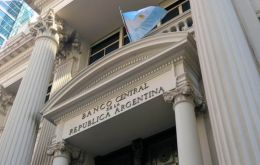
As a direct consequence of political uncertainty ahead of the primary elections to be held by the different Argentine political parties on Sunday, the US dollar in the black market climbed 5 Pesos during the first seven working days of September, reaching 187 Argentine Pesos.
-
Monday, September 6th 2021 - 09:47 UTC
Argentine right-wing candidate rounds up campaign before large crowd and with endorsement from Bolsonaro Jr

Neoliberal right-wing candidate Javier Milei Sunday closed his electoral campaign ahead of next weekend's Open Primary, Simultaneous and Mandatory elections (PASO) at Buenos Aires' Parque Lezama before a crowd of between 20,000 and 50,000 depending on the sources.
-
Saturday, September 4th 2021 - 08:49 UTC
Paraguayan Chancellor waiting for after Argentine PASO elections to discuss reopening borders
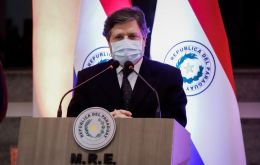
Paraguay's Foreign Minister Euclides Acevedo Friday insisted on discussing the reopening of the land borders with Argentina right after the Sept. 12 Open Primary, Simultaneous and Mandatory (PASO) elections.
-
Thursday, September 2nd 2021 - 09:50 UTC
Argentina primary elections: Ruling coalition still ahead in polls in the most important electoral district

According to most surveys, opposition candidates are still trailing those of the ruling Frente de Todos (FdT) coalition in Argentina's province of Buenos Aires, the country's largest district, less than two weeks before Sept. 12's Open Primary, Mandatory and Simultaneous (PASO) elections.
-
Friday, August 27th 2021 - 09:32 UTC
Legislator from the Argentine province of Corrientes shot during a campaign speech
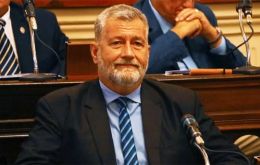
Peronist provincial lawmaker Miguel Arias was shot at during the party's closing ceremony not far from the town of Paso de Los Libres as the province of Corrientes gets ready for this coming Sunday's elñections where the offices of Governor and Vice Governor will be at stake.
-
Thursday, July 22nd 2021 - 07:42 UTC
A majority of Argentines, 51%, favor an opposition alternative for midterm elections
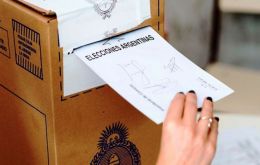
Only hours before the different Argentine political parties must register their candidates for the PASO primaries – simultaneous and mandatory – on 12 September, ahead of the midterm election on 14 November, a local public opinion poll has released interesting data on the different leaders and hopefuls, having covered the whole Argentine territory.
-
Thursday, June 17th 2021 - 09:40 UTC
May's inflation in Argentina was 3.3%: What will happen after the elections?

Argentina's inflation in May was 3.3% for a year-on-year accumulation of 48.8%, the highest mark since March 2020, according to the National Institute of Statistics and Census (INDEC)
-
Thursday, June 3rd 2021 - 08:22 UTC
Argentine Senate passes bill to postpone primary, mid-term elections
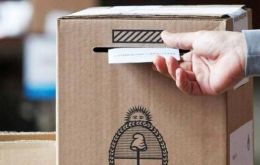
Argentina's Senate Thursday passed the bills submitted by the Government of President Alberto Fernández postponing this year's elections and changing earnings taxation for companies.
